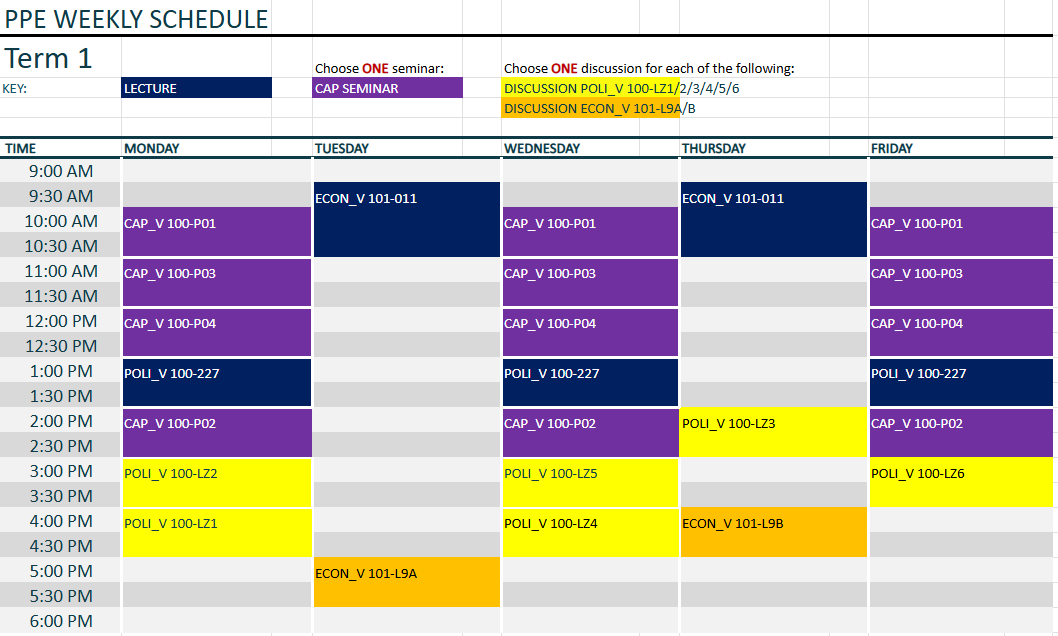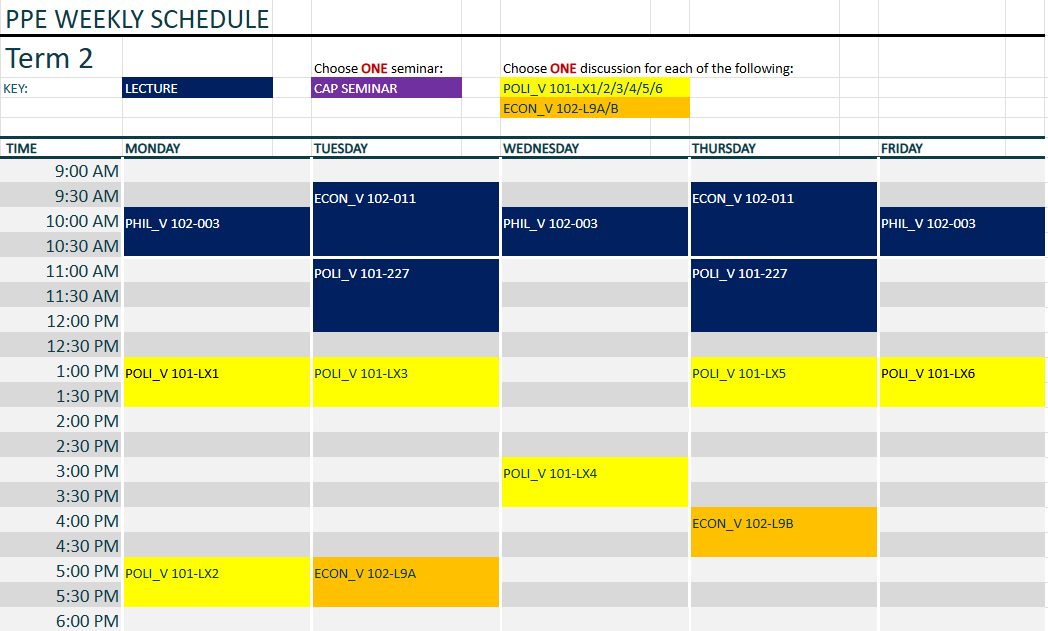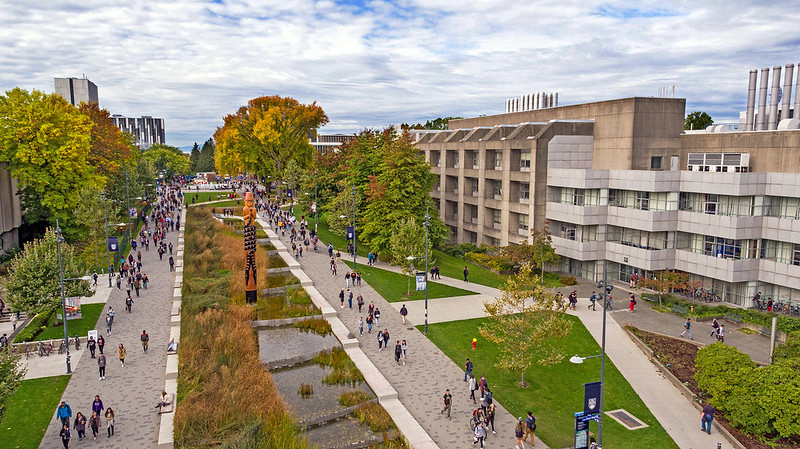Making a difference starts with a different kind of thinking. This stream invites students to ask tough questions, think together openly and critically, and engage with the world through research and discussion.
Students will learn about government policy, economic organization, and social justice as they encounter the processes, systems, institutions, and values that shape our societies. This stream is loosely modelled on a successful undergraduate program at the University of Oxford.
The CAP program provided an excellent transition from high school to university and provided me with a skills toolkit to succeed at UBC. My ASTU class (now called CAP 100/101) with Dr. McNeill prepared me to tackle academic writing and research. I learned how to ask effective questions and the critical thinking skills I gained I was able to apply in all my research papers.
Courses: Term One
In the first term, students will enrol in CAP 100 (their writing course), Economics, and Political Science. In CAP 100, students will study how politics, economics, and philosophy intersect, as well as learn about the features of academic writing in a scholarly setting. The introduction to politics class will set the foundation for the understanding of politics in future political science and other related courses. The study of microeconomics will also introduce students to the economic theories behind the fundamental relationship of demand and supply in our economy.
Analysis of and practice in academic research and writing in the social sciences and the humanities. Restricted to students in the Coordinated Arts Program. Credits count toward the Writing Component of the Faculty of Arts Writing and Research Requirement.
This course is not eligible for Credit/D/Fail grading.
CAP_V 100-P01 (MWF 10-11am) and CAP_V 100-P02 (MWF 2-3pm) - Instructor: Dr. Kasim Husain
SOCIAL MEDIA AND SOCIAL CHANGE
In 2025, it is becoming unreasonable to call social media “new media." As social media has become an established media form and is so pervasive in our daily interactions, it can be hard to account for just how much social media impacts how we live our lives and connect with others. This brings us to the central question we will discuss in this course: what has social media done to us, and what can we do with social media? Our case studies will entail contrasting scholarly perspectives on how online behaviours impact mental wellbeing, and social media’s role in the revolutions of the so-called Arab Spring in 2011, and in building solidarity for Indigenous rights and/as climate justice. We will evaluate these examples of social media’s individual and societal impacts in relation to films such as Eighth Grade (2018), The Square (2013), and Yintah (2024).
ECON_V 101-011 (TTh 9:30-11) - Instructor: Dr. Clive Chappel
Introduction to consumer behaviour, producer theory, competitive market equilibrium, welfare economics, monopoly, oligopoly, and foundations of strategic interactions. Credit will be granted for only one of ECON101 or ECON 310. Equivalency: ECON 310
POLI_V 100-227 (MWF 1-2) - Instructor: Dr. Spencer McKay
Political issues and case studies, drawn from Canadian and international contexts, will be used to introduce students to central debates and concepts of politics and political analysis.
Courses: Term Two
In the second term, students will enrol in Philosophy, Economics, and Political Science. An introduction to philosophy will develop critical thinking and logical reasoning, as well as establish the most well-known philosophies behind issues such as morality, ethics, and justice. Moving from microeconomics to macroeconomics, students will study economic frameworks that we use to make sense of economics at a larger societal or national level. Students will also learn to apply the concepts learnt in the first term to the context of Canadian politics.
PHIL_V 102-003 (MWF 10-11) - Instructor: TBA
Basic problems and methods of philosophy. Topics such as morality, personal identity, free will and determinism, and the meaning of life. Credit will be granted for only one of PHIL 100 or PHIL 102.
ECON_V 102-011 (TTh 9:30-11) - Instructor: Dr. Emrul Hasan
Elements of theory and of Canadian policy and institutions concerning the economics of growth and business cycles, employment, national income accounting, interest and exchange rates, money and banking, the balance of trade. Credit will be granted for only one of ECON_V 102 or ECON_V 311. Equivalency: ECON_V 311
POLI_V 101-227 (TTh 11-12:30) - Instructor: Dr. Kenny Ye
Canadian governments, politics, and public policy. How policies emerge from politics contested through the interaction of institutions (Constitution, Parliament, federalism, elections, and the courts) and actors (individuals, parties, interest groups, nations). Insights are applied to explain current events and controversies.
Courses: Schedule
Preview how a week looks in the stream:
Sample Projects
Article Review
Students are given a choice of topics on which to write a short paper. They are asked to choose one article that they will use for the short paper and to write a separate article review on it. This assignment is designed to aid the student in choosing appropriate materials for research papers, understand the key arguments from the material, and succinctly communicate that argument.
Literature Review
Students choose a research topic (based on the focus of their section of ASTU 101, now CAP 100), and then write a scholarly literature review. Students learn to identify major abstractions (or concepts), find appropriate secondary sources using the library databases, place academics in discussion with one another, and take a position within this conversation.


